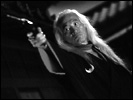Izo
- Year
- 2004
- Original title
- Izo
- Japanese title
- IZO
- Director
- Cast
- Running time
- 128 minutes
- Published
- 28 January 2005



by Tom Mes
The word about Izo was already out before a single frame of the film had been shot, thanks entirely to the dream team match-up of Takashi Miike and Takeshi Kitano. Creating ripples by means of casting choices was very much the intention of the group of investors backing the project; by casting Kitano and a bevy of famous faces in supporting roles, bit parts, and cameo appearances they could attract a general audience to a film whose appeal might otherwise have been limited. A difficult film, one with things to say and questions to raise.
For a production committee whose members are more familiar with churning out made-to-order genre material for the video market, including prolific V-cinema producer Excellent Film and distributor KSS, Izo is indeed a project of genuine ambition. Taking the final scene of Hideo Gosha's Hitokiri - the execution of homicidal 19th-century samurai Izo Okada - as its starting point, this was never meant to be any old chanbara, but a meditation on mankind's eternal propensity for violence and destruction.
Though no strangers to more traditional genre fare themselves, screenwriter Shigenori Takechi and director Takashi Miike previously showed a talent for creating powerful allegory within a formula framework with the astonishing Graveyard of Honour, whose loose-cannon protagonist was the embodiment of the social chaos of rudderless, post-bubble Japan. Izo in many ways is that film's companion piece and follow-up. Like Graveyard, it takes a minor figure from the more obscure regions of Japanese history, wrests him from his times and finds in him the personification of more acute social ills.
The intentions of Izo are quite clear from the film's opening minutes. Beginning with found footage (a Miike tendency, witness its use in for example Graveyard of Honour and Dead or Alive Final), sex education films on the workings of the male reproductive organ, and a barrage of images from 20th-century wars, it segues into the aforementioned execution of Izo Okada, crucified and run through with spears (handled by two of the film's guest stars, Kenichi Endo and Susumu Terajima). Miike shows Izo's sentence in an agonisingly protracted scene and thereby sets the tone for the rest of the film. What follows is Izo being reincarnated time and time again, flying back and forth through history, always pursued by the ghosts of his victims and his own urge and capacity for coldblooded violence.
At 128 minutes, most of which is scenes of the protagonist slashing his way through humans and demons alike amid a variety of backdrops and time frames, protracted is indeed the word for Izo. The film has already suffered a good deal of criticism as a result of this, with the words overlong and repetitive being those most commonly employed qualifications. This is fully justified. There is no arguing that Izo is protracted and repetitive and that as a result of this its message becomes heavy, ponderous, and perhaps even, to use that most lazy of adjectives, pretentious.
That Miike is generally not too concerned with serving his audience a snug, comfortable viewing experience is well known. That this is increasingly also true of the structure of his films is clear from a look at his output of the past three years or so. More and more of his films have been breaking the two-hour barrier and/or defied easy to follow narrative constructions. Back in 2000, Dead or Alive 2 already had people scratching their heads over continuous and seemingly arbitrary leaps in logic, but this was just a taste of what was to follow: Dead or Alive: Final, Ichi the Killer, The Happiness of the Katakuris, Agitator, Graveyard of Honour, Deadly Outlaw: Rekka, Gozu, the short film Box in the Three… Extremes omnibus, and now Izo. This list unmistakably shows a progressively experimental filmmaker at work. (That he, in a parallel development, with the likes of One Missed Call, Zebraman and The Great Yokai War, also seems to be an increasingly commercial filmmaker at the same time is an intriguing paradox.)
Miike's bold stylistic extremism always has a reason. Unmotivated it may seem at first glance, but a closer and more attentive look inevitably shows that the rationale can be found in characters and themes. Made during troubled times, Izo talks about violence as an enduring part of our human life cycle, about our desire for it being as strong as our desire to procreate. Izo is protracted and repetitive because our predilection for violence is just that. It never ends, generation upon generation, age after age. In his countless confrontations with the denizens of the netherworld, Izo Okada never dies, despite suffering wounds that under normal circumstances would be mortal. If he symbolises our capacity for violence, how can he die? As long as violence comes his way in the guise of his attackers, he continues to exist. Fighting violence with violence creates a neverending cycle of destruction.
Repetition and endurance are therefore this film's main motifs, represented by the patterns of reincarnation and anachronism that are applied throughout. While this may not make for easy viewing, there's no denying their motivation. Whether it was the wisest choice in the end remains a moot point. The film's length adds to its laborious tone and it could be argued that the same message would have been equally, or perhaps more, clearly put across in a shorter time span. After all, the opening ten minutes already encapsulate much of what follows.
Dismissing a Miike film, though it seems to come quite easy to some, is hardly ever a cut-and-dried issue, though, at least to this writer. This is as true for Izo as it was for, say, Ichi the Killer. Both films dish out the violence in copious quantities, but they also pose genuine and fundamental questions about our relationship to it: the latter about how we deal with its depiction on a personal level, the former about how we relate to it collectively. And despite his often mischievous approach (in this one it's talking flowers, a hippy troubadour, a V-cinema bit player as lead actor, and scenes shot entirely upside down or in the style of silent chambara movies), the director skilfully avoids having his cake and eating it too. Izo confirms that the mixed feelings Miike's work can provoke only add to its ongoing allure.